April 2022: Olive Tree

Volume VII/Issue 1/April 2022


From The Editorial Desk
Russia Europe And The United States
As we all watch the events in Europe unfold with Russia’s invasion of Ukraine, our hearts go out to the dear people of these countries. Many lives have already been lost and no doubt many more will die. Our prayers are also for our brothers and sisters in Christ throughout that part of the world as their faith is being severely tested.
There is a heightened level of uncertainty and concern as to how these actions will affect our own nation and personal lives. As believers in the Lord Jesus Christ, we should not be surprised that our world’s condition is deteriorating. The scriptures instructs us clearly that the last days will be perilous, dangerous and war-torn.
We must not allow fear to control us. We must not allow our faith to fail us. We must not allow anger, bitterness or blame to grip our hearts and minds! And under no circumstances must we quit, give up or turn back!
Now is the time to:
1. Seek the Lord with all of our hearts (Ps. 105:4).
2. Trust God to take care of us ( Ps. 118:6–9).
3. Assemble together faithfully to praise our Lord and to exhort one another (Heb. 10:25). I’m reading of missionaries who are staying with their congregations as they assemble together in Ukraine even in the midst of a violent invasion by a foreign nation.
4. Humble ourselves before the Lord in prayer (II Chron. 7:14).
5. Put aside personal squabbles, selfishness and offenses (Eph. 4:32).
6. Stay alert and prepared for the return of our Lord (Mark 13:33–37).
7. Commit ourselves to winning people to Christ and His Church as never before (Prov.11:30)!
Here at Vatican In Exile we are going to “stay the course.” Our schedule is full and we are pressing on because “maybe today” our Lord will come!

Tithing
In the Old Testament, there were various offerings to be made.
"The first of the fruits of thy ground thou shalt offer in the house of the Lord thy God." [Exodus 34:26] We can offer our first fruits, by offering the first part of our day to Almighty God. We should arise to silence, because noise keeps us away from God. Our first thought should be a prayer. Let us remember this simple maxim, God first. We should have a morning prayer routine, which gets us started off on the right foot. The devil said to one of the saints, that if he could have the beginning of the day, he would have the person.
Of course, we should end the day well, so we can end our lives right. Saint John Vianney tells us that not all of the saints began well, but they all ended well. To end our life well, we need to begin and end each day with the Lord.
What we need is a rule of life. And actually we already have one, which we are living by. We need to take some time this week and see what it is by writing down what we are doing each hour of the day. Romans 7:19: "For the good which I will, I do not: but the evil which I will not, that I do." How many of us will find the same thing in our own lives. We will most likely find out that we are not doing the good we should, but doing evil in its place. We need to replace evil with good in our lives.
Saint Paul tells us (Philippians 4:6-7): "Be nothing solicitous; but in every thing, by prayer and supplication, with thanksgiving, let your petitions be made known to God. And the peace of God, which surpasseth all understanding, keep your hearts and minds in Christ Jesus."
"And all Juda brought the tithe of the corn, and the wine, and the oil into the storehouses." [2 Esdras 13:12] A tithe is ten percent. However, let us consider how we can give ten percent of ourselves to Almighty God. A book I have suggests tithing our time. Ten percent of our time is two hours and 24 minutes a day. It may sound like a lot, but consider how we spend our time. We should have already taken a week and seen where our many hours go and are wasted, which could be spent with God. We have 168 hours a week. Can't we give God some of this time? And there are many ways. There is prayer, both vocal and mental, that is in the heart. We can read our Bible and study it. There are other good books we can read. We can study our catechism, because Saint John Vianney also says that the majority of Catholics who are lost are lost, because they do not know their own faith.
A reporter asked a Nun about prayer:
"What do you say to God when you pray," he inquired.
"Nothing," replied the Nun. "I just listen."
"What does God say to you?" he responded.
"Nothing," replied The Nun. "He just listens."
This reminds me of a story about a workman, who would stop in the church every evening for quite a while. Finally the pastor stopped him and asked him what he did with all of that time in church. The workman responded, "I look at Him and He looks at me."
Prayer is not always about saying something or receiving great inspirations, but being with God. "Now it came to pass as they went, that he entered into a certain town: and a certain woman named Martha, received him into her house. And she had a sister called Mary, who sitting also at the Lord's feet, heard his word. But Martha was busy about much serving. Who stood and said: Lord, hast thou no care that my sister hath left me alone to serve? speak to her therefore, that she help me. And the Lord answering, said to her: Martha, Martha, thou art careful, and art troubled about many things: But one thing is necessary. Mary hath chosen the best part, which shall not be taken away from her." (Luke 10:38-42) Are we choosing the best part?

On Calumny
 Dependence Day
Dependence Day
While serving Christ one must remember that one needs to depend entirely upon Christ. An independent spirit only produces frustration and failure. As creatures we totally depend upon the Creator. As finite we completely need the Infinite. As servants we look entirely to the Master.
There are many clergy today going about the work of the Church in their own power which is the power of the flesh. Many individuals possess great gifts and talents and enjoy unusual skills. However, none of these make a successful servant. A man may go on for years seeming to accomplish much for the work of the ministry, yet in the Lord's estimation little may be worthy of reward.
Our Lord in John 15:5 said, "am the vine: you the branches: he that abideth in me, and I in him, the same beareth much fruit: for without me you can do nothing." These are powerful words. That which one does apart from dependence upon the Lord Jesus Christ and by His Spirit amounts to nothing.
No matter how wonderful or impressive one's works might appear unto men, without our works being the product of abiding in Christ they will amount to nothing. As the branch of the grape vine cannot produce fruit unless it remains attached to the vine and draws its nutrients and power from it, neither can the servant of the Lord. It is in Christ that we find our righteousness, holiness, and our acceptance to produce fruit. Apart from Him all of our righteousness appears before God as “as the rag of a menstruous woman” (Isaiah 64:6). We have nothing in us, apart from Christ, that can produce good fruit acceptable to God. "For I know that there dwelleth not in me, that is to say, in my flesh, that which is good." (Romans 7:18)
We must understand and remind ourselves often that all of our skills, talents, gifts, and abilities are a gift from God. We breathe His air, eat His food, live in His world, and enjoy His blessings. Without God there is nothing. If you are going to serve God you must do it with an attitude of dependence upon Him. Paul the apostle says in I Corinthians 15:10, "But by the grace of God, I am what I am; and his grace in me hath not been void, but I have laboured more abundantly than all they: yet not I, but the grace of God with me. " Do you see Paul's dependence upon the grace of God to be what he was and to do what he did? Paul does not boast in his abilities, but rather he boasts in the Lord's ability in and through him. Paul sees himself as a willing branch abiding in the vine producing fruit. Remember, the fruit is called the fruit of the Vine not the fruit of the branches!
As we can do nothing without Christ it is also true that we CAN do everything with Him. "I can do all these things in Christ who strengtheneth me." Philippians 4:13 The grace of God provides the power to do what we cannot do by ourselves, the power to be what we cannot be by ourselves, and the power to see that which we cannot see by ourselves. Grace enables us to serve the Lord Jesus Christ. Indeed we truly can do all things through Christ because as Paul said, "yet not I, but the grace of God with me." I Corinthians 15:10
The things that made the great Saints of the past great was the grace of God upon them. What they accomplished for Christ they accomplished through their dependence upon Him. Paul said again, "when I am weak, then am I strong and powerful." II Corinthians 12:10 Paul found that when he trusted in himself he failed because of the weakness of the flesh. However, when Paul trusted in the Lord he found himself strong by the power of God through the spirit.
We must learn to depend upon God. Too often we depend upon men, institutions, and organizations but not God. Far too often we depend upon money, resources, intelligence, and ability instead of depending upon God for the accomplishment of our tasks. We find that we are warned in the scripture to be careful of depending upon temporal props instead of eternal power. Psalm 20:7-8, "Some trust in chariots, and some in horses: but we will remember the name of the Lord our God. They are brought down and fallen: but we are risen, and stand upright." Psalm 33:16-17 says, "There is no king saved by the multitude of an host: a mighty man is not delivered by much strength. An horse is a vain thing for safety: neither shall he deliver any by his great strength." Psalm 118:8-9 says, "It is better to trust in the Lord than to put confidence in man. It is better to trust in the Lord than to put confidence in princes." These lessons are often hard learned! God is trying to tell us that it is not the strength or power of earthly things that secures the victory but rather the power of the Heavenly King granted in response to our dependence and faith in Him.
"And he answered, and spoke to me, saying: This is the word of the Lord to Zorobabel, saying: Not with an army, nor by might, but by my spirit, saith the Lord of hosts." Zechariah 4:6 Dependence! Let that word burn itself into your memory and allow it to become part and parcel of your life. Without it you will fall, yet with it you will succeed. We need to depend upon God for everything. II Corinthians 9:8 says, "And God is able to make all grace abound in you; that ye always, having all sufficiency in all things, may abound to every good work," God keeps His word. He provides all that you need to serve Him. All you need whether it be physical, spiritual, emotional, intellectual, financial, or material He will provide. After all, God wants you to be successful in your vocation and in the Christian life that he has called you to, more than even you yourself want to be.
Do not get in the trap of depending on others for your sufficiency. If you do you will find that you will live on a treadmill of disappointments. When you get your eyes off of God and on to what others can do for you then you are in danger. Your sustenance comes from above from the Lord Jesus Christ and not from men. God does certainly use men to bless you and provide for you, but always remember that you are depending on Him and not on the vehicles that He may choose to meet your needs. Be thankful for those whom God chooses to use in your life to be a blessing to you. Be thoughtful and remember to let others know of your thankfulness, but always be mindful of your Source which is the Lord Jesus Christ.
The dependent servant finds that his Lord never fails. Jesus told us in Matthew 6:24-33, "“Therefore I tell you, do not be anxious about your life, what you will eat or what you will drink, nor about your body, what you will put on. Is not life more than food, and the body more than clothing? Look at the birds of the air: they neither sow nor reap nor gather into barns, and yet your heavenly Father feeds them. Are you not of more value than they? And which of you by being anxious can add a single hour to his span of life? And why are you anxious about clothing? Consider the lilies of the field, how they grow: they neither toil nor spin, yet I tell you, even Solomon in all his glory was not arrayed like one of these. But if God so clothes the grass of the field, which today is alive and tomorrow is thrown into the oven, will he not much more clothe you, O you of little faith? Therefore do not be anxious, saying, ‘What shall we eat?’ or ‘What shall we drink?’ or ‘What shall we wear?’ For the Gentiles seek after all these things, and your heavenly Father knows that you need them all. But seek first the kingdom of God and his righteousness, and all these things will be added to you. "
Hear ye Him!

Crack Pipes for Free?
The Biden administration will soon fund the distribution of crack pipes to drug addicts in underserved communities for the purpose of “advancing racial equity,” the Washington Free Beacon reported.
The baffling measure is included in the Department of Health and Human Services’ fiscal year 2022 Harm Reduction Program Grant program. In the document, the crack pipe plan is described as the dispersion of federal government funds for the slightly more anodyne “smoking kits/supplies.”
...A spokesman for the department recently told the Washington Free Beacon that the grant money will do exactly what the headline says it will do. —Phil Shiver, theblaze.com
Nurse Punished for Wearing Cross Necklace to Work Wins Religious Discrimination Case
A British tribunal has ruled that a Christian nurse who was forced to resign from a hospital over her refusal to stop wearing a cross was wrongfully discriminated against.
The Employment Tribunal ruled [January 5] that Mary Onuoha had been mistreated by the Croydon Health Services NHS Trust when they demanded that she stop wearing a cross to work.
The tribunal rejected the hospital’s claim that the cross necklace presented a high infection risk, noting that other items like rings and hijabs were permitted at the facility.
—Michael Gryboski, christianpost.com
Judge Denies Porn Giant’s Motion to Dismiss Child Sex Abuse Survivors’ Lawsuit
A federal judge in Alabama has allowed a class-action lawsuit by survivors of child sexual abuse against the parent company of popular pornography website ___ and other porn websites to move forward.
U.S. District Judge L. Scott Coogler...rejected the argument that [defendant] is protected through Section 230 of the Communications Decency Act, which grants a level of immunity for video hosting websites and social media platforms with third-party content.
“[T]he Court finds that Plaintiffs have plausibly alleged that Defendants indeed materially contribute to the provision of child pornography on their platforms,” wrote Coogler.—Michael Gryboski, christianpost.com
Other News Briefs
• Parent activists are expected to stage a protest outside a Virginia public library in response to sexually explicit books and troll dolls dressed in LGBT colors being displayed next to the Holy Bible as part of its Christmas display, which many Christians saw as an attack on their faith....The protest comes in response to outrage over a Christmas display where...books...which promote pedophilia [were] displayed next to the Holy Bible (Ryan Foley, christianpost.com).
• North Dakota has banned the teaching of critical race theory in public schools, becoming the latest state to try to keep the controversial framework from entering the public school curriculum....The new law defines CRT as “the theory that racism is not merely the product of learned individual bias or prejudice, but that racism is systemically embedded in American society and the American legal system to facilitate racial inequality” (Michael Gryboski, christianpost.com).
• Islamic extremists beat a Christian apologist and evangelist unconscious as he was traveling to participate in a debate about Christianity and Islam in Kampala, Uganda....Two men stopped the car of 43-year-old apologist Charles Kamya when he was about 300 meters from the open-air debate site...and then a mob attacked him, Morning Star News reported....“I stopped my car only to be ambushed by six other Muslims in Islamic attire who resurfaced from the bush at around midday,” Kamya was quoted as saying from his hospital bed (Anugrah Kumar, christianpost.com).
• The leadership of a Connecticut school district has issued an apology after parents expressed outrage over an assignment that asked students about their likes and dislikes when it comes to sexual activity (Ryan Foley, christianpost.com).
• Facebook has now restored the pages of Christian ministries it says were “incorrectly removed” from its platform amid a purge of content that offers “services that aim to change people’s sexual orientation or gender identity” (Brandon Showalter, christianpost.com).
Malta Rejects Europe’s Demand to Legalize Abortion
For standing up for unborn babies’ right to life, Malta is being accused of cruelty toward women.
In a report...Council of Europe Human Rights Commissioner Dunja Mijatovic demanded that Malta legalize abortion on demand and curtail conscience rights for pro-life medical workers, according to the Malta Independent....
[Mijatovic] likened Malta’s protections for unborn babies to torture and claimed its pro-life laws deny women basic human rights.
Mijatovic also advocated for restricting the conscience rights of medical workers who refuse to abort unborn babies....
The Maltese government quickly rejected Mijatovic’s recommen dations. Responding to her report, the nation’s leaders affirmed their support for sexual and reproductive health services but rejected the notion that these services include an “intrinsic right” to abort an unborn baby....
They pointed out that their pro-life issues do not put women’s lives in jeopardy.
—Micaiah Bilger, lifenews.com
Doctor Banned From Saving Babies Gets His Day in Court
A High Court in the U.K. is scheduled to hear the case of a Christian doctor who has been banned from providing life-saving treatment for unborn babies....
...The Royal Courts of Justice will hear the case of Dr. Demot Kearney...who works for Britain’s National Health Service....
...An interim Orders Tribunal blocked Kearney from providing emergency abortion pill reversal treatment for up to 18 months after the abortion provider...filed a complaint to the General Medical Council, the Daily Mail reported.
Abortion pill reversal involves administering the natural hormone progesterone to a pregnant woman who wants to urgently reverse the effects of the first abortion pill, mifepristone.
The abortion provider claimed in the complaint that Dr. Kearney prescribed a treatment that has “no evidence base” behind it, imposing his anti-abortion beliefs on patients.
...Sue Turner, director of Principles for Life, told the Christian Post...that if a pregnant woman who has taken the first of two abortion pills decides she’s made a mistake and wants to keep her baby, she would have a relatively high chance of delivering a healthy baby if she was to undergo the reversal.—Anugrah Kumar, christianpost.com
Feminist Claims Pregnancy Is a Disease, So Killing Babies in Abortions Is Necessary
A recent article in Ms. magazine [Ed.: a decidedly liberal, feminist publication] describes pregnancy as more like a disease than a natural part of a woman’s life.
The headline states: “Pregnancy and Childbirth Endanger Women’s Lives and Health: 'Pregnancy Is Not a Benign Condition.’ ”
[In the] reading [of] the piece, the message becomes clear—the abortion industry will say whatever it has to say to convince women that abortion is a necessary. It will use fearmongering and scare tactics to persuade society of the need for abortion on demand.
The article...dehumanizes pregnancy by labeling it a “health risk.”...
Women likewise should know all the information about the risks that abortion poses. We can and should protect both the life of the mother and that of her unborn child, because both lives are sacred.—Virginia Allen, lifenews.com
Economic Update
Weapons of Mass Destruction
Last December in the Olive Tree we discussed that the dollar is not money. https://www.vaticaninexile.com/december_2021_the_dollar_is_not_money.php The US dollar is backed by the full faith and credit of the United States.
It is also backed by the faith of the world. In 1944 at Breton Woods the US dollar became the world's reserve currency. What this means is that international trade is conducted in dollars rather than Euros, Yen or some other currency. At the time foreigners could redeem $35 for an ounce of gold. In 1971 President Nixon ended all of that. The dollar is basically worthless objectively speaking. It like all other world currencies depend upon people's faith that the currency they get today they can exchange for something of value tomorrow. Currency is merely a convenience.
As the reserve currency it is easier for the government to borrow dollars on the international market. The world considers that the dollar has some sort of value. This puts the US in a powerful position.
What happens, when the dollar ceases to be the reserve currency? When this happens the dollar will lose value in the eyes of other, because of the US's massive debt, which cannot be repaid. Much more is owed than exists to repay it. In the discussion on living wages https://www.vaticaninexile.com/july_2021_living_wages.php we considered how the fraud of central banking works. " The central bank creates currency out of nothing, which is fraud. Then they loan it into existence to buy government bonds or to the banks and charge for the use of it, which is usury. There is a fraud that is not considered. Let us say the central bank creates a million rasbutniks for use in their country. This is the only currency permitted to be used as money. They charge the modest sum of one percent a year, compounded yearly, for the use of these rasbutniks. Let us say they take no other action for ten years. There are a million rasbutniks in circulation, but there are 1,104,622 rasbutniks owed back to the central bank. In other words there are over 100,000 more rasbutniks owed than are in existence to repay them. The central bank basically now controls this country, since more is owed than can ever be repaid. Put that into the real world where countries have had central banks for decades, some for over a century, and one can easily see a large problem."
The second gulf war was started, because Saddam Hussein had weapons of mass destruction. However, none were found, or so we thought. When we think of weapons, we think of everything from a sling shot to an A-bomb. However, there are other far more powerful weapons. One is economic, as is being tried with Russia at the current time. Saddam Hussein was negotiating with Europe to sell oil directly in exchange for Euros instead of dollars. This was his economic weapon of mass destruction. The United States started a war to stop this. This shows you how important it is to remain the world's reserve currency.
With the reaction to COVID by creating trillions of dollars and giving them away, the dollar is going to become worthless. Much of this currency has yet to be spent by the various entities, so has not caused inflation yet, because inflation is merely an increase in the amount of currency in existence. The symptom of this disease is rising prices.
Two pieces of news came to light at the end of March. Saudi Arabia is now considering accepting yuan instead of dollars in oil sales with China. And the second piece of news. Russia is considering selling its oil and gas for bitcoin as sanctions intensify from the West. These two moves will undermine the position of the dollar. This will make it more difficult to borrow money in the world market. The Federal Reserve will simply go on a printing spree, which will eventually lead to hyperinflation. The world is changing, and as we see signs of the times, we will tell you more about the condition of the fig tree. "And from the fig tree learn a parable: When the branch thereof is now tender, and the leaves come forth, you know that summer is nigh." (Matthew 24:32) The economic fig tree is dying and losing its leaves.
A third piece of news has come to light. Russia is selling natural gas for gold to get around sanctions. Gold is used as money still by some people, and it is recommended by some to have a supply on hand personally to prepare for the coming economic collapse. "Neither shall their silver and their gold be able to deliver them in the day of the wrath of the Lord: all the land shall be devoured by the fire of his jealousy, for he shall make even a speedy destruction of all them that dwell in the land." (Sophonias 1:18) And this from Ezechiel (7:19): "Their silver shall be cast forth, and their gold shall become a dunghill. Their silver and their gold shall not be able to deliver them in the day of the wrath of the Lord. They shall not satisfy their soul, and their bellies shall not be filled: because it hath been the stumblingblock of their iniquity."
"Casting all your care upon him, for he hath care of you." (1 Peter 5:7) Let us consider the lilies of the field. (See Luke 12:25-31 and Matthew 6:25-34) In both cases the solution is simple: "Seek ye therefore first the kingdom of God, and his justice, and all these things shall be added unto you." Let us never lose sight of this important point of seeking God first and seriously. Let us put our lives right with God, and He will lead us through the coming storm.

The Funny Pharmacy
A joyful mind maketh age flourishing: a sorrowful spirit drieth up the bones. - Proverbs 17:22

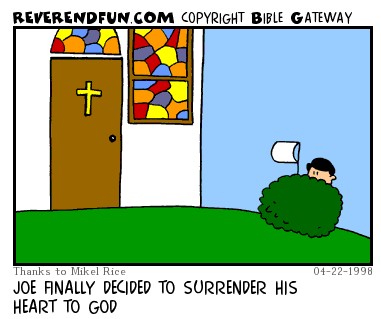






Frequently Asked Questions

Do you believe it is possible for ardent Buddhists or Protestants to be saved?
Let me break down your question as I answer it.
1. It does not matter what I believe or what anyone else believes. It is what the Word of God says and what the Church, who has been given authority to instruct and interpret the Word of God says.
2. The definition of ardent is: enthusiastic or passionate. With that definition in mind, let us understand the difference between the Buddhist and the Protestant.
3. Buddhist do not believe that Jesus is God, so in there enthusiasm or passion for Buddhism they can not be saved in that state. Now God may see their enthusiasm and passion for God and bring things into their lives to bring them toward a faith in Jesus. An example would be “Cornelius, a centurion, a just man, and one that feareth God, and having good testimony from all the nation of the Jews” See Acts 10
It is important to determine what any belief system teaches about the deity of Christ. The Scripture is clear concerning the Word (Jesus) becoming flesh, and that Jesus is the true God and the only way to eternal life (see John 1:1–18; 1 John 5:20). The New Testament reveals that Jesus is equal with God the Father in all attributes of deity, and thus the substance of deity (Phil. 2:6), and (Col. 1:19). Our confession of Jesus as Lord includes acknowledgment of His deity: Only God can save us from sin.
4. Concerning ardent Protestants: your question is very broad. We can only assume that this ardent Protestant believes that Jesus is God, and we can only assume that they have repented and been baptized for the remission of their sins. Then as an ardent Protestant it can only be assumed that they have a desire to learn and know more and more about God. We are always growing. If a Protestant has been presented with the truth of the Catholic Faith and is allowing the Spirit of God to work within themselves a greater understanding of and an acceptance of the Faith, then they stand on the path which could ultimately lead them to salvation, which is found only within the Church. Such a person should be encouraged in their spiritual growth.
In short, a Protestant who is genuinely ardent will ultimately be led to the Catholic Church, wherein is salvation.
For answers to more frequently asked questions, click here: https://www.vaticaninexile.com/frequently_asked_questions.php
The Pope Speaks: April 2022
Fatima And the Consecration of Russia to the Immaculate Heart of Mary

With the recent actions in Rome by George Bergoglio aka Antipope Francis, We have decided to weigh in on this matter. Twice We have said that Fatima is a distraction, because much effort has been wasted on Fatima. Much more is being wasted right now debating whether or not Bergoglio's consecration was done properly. This can be set aside with one simple statement, an Antipope cannot perform a consecration properly.
A decade ago We were sent a book, False Friends of Fatima. After reading it We realized that the author is also a false friend of Fatima, although he provided one very useful piece of information.
"In the end my immaculate heart will triumph." Has anyone ever stopped to consider what Mary will triumph over? Before the seventh Psalm on some Marian feasts, including the Annunciation (March 25) we pray: "Joy to thee, * O Virgin Mary, thou hast trampled down all the heresies in the whole world." The real enemy of souls is heresy, and heresy is one of the errors of Russia no one talks about. In fact, Communism has been condemned by Pope Pius XI as apostasy. Does anyone ever talk about that?
First of all We will most likely never see the Third Secret of Fatima, so let's stop looking for it. There are only a few things we actually can know about it. We should also set aside the Secret of La Sallette, because it is easy to prove every one of them false, and it has been placed on the Index of Prohibited Books. So let us stop looking for secrets.
Let us consider what Mary actually said: "You have seen hell where the souls of sinners go. To save them, the Lord wishes to establish in the world devotion to my Immaculate Heart. If you do what I shall tell you, many souls will be saved and there will be peace. The war is about to end, but if men do not cease to offend God there will begin a worse one in the Pontificate of Pius XI. When you see a night illumined by an unknown light, know that this is the great sign that God gives you that the punishment of the world is at hand for its so great sins by means of war, famine and persecution directed against the Church and the Holy Father. To prevent this I shall come to ask for the consecration of Russia to my Immaculate Heart and the Communion of reparation on the first Saturdays of the month. If my demands are listened to Russia will be converted and there will be peace. Otherwise Russia will spread her errors throughout the world arousing wars and persecutions of the Church. Many good men will be martyred; the Holy Father will have much to suffer; various nations will be annihilated. In the end my Immaculate Heart will triumph. The Holy Father will consecrate Russia to me; Russia will be converted and there will be some peace.
"But, finally, my Immaculate Heart will triumph. Consecration to my Immaculate Heart will take place, Russia will be converted and a time of peace will be given to the world. The Holy Father will consecrate Russia to me; Russia will be converted and there will be some peace."
Let us take this point at a time. "If my demands are listened to Russia will be converted and there will be peace" Mary's demands were not met, so we get option B: "Otherwise Russia will spread her errors throughout the world arousing wars and persecutions of the Church. Many good men will be martyred; the Holy Father will have much to suffer; various nations will be annihilated. In the end my Immaculate Heart will triumph." Russia has spread her errors and all of this is being fulfilled.
"The Holy Father will consecrate Russia to me; Russia will be converted and there will be some peace." On June 13, 1929 Lucia received the following, which is paraphrased: "Now is the time for the Pope in union with all the bishops of the world." As requested on the afternoon of July 16, 1990, We consecrated Russia to the Immaculate Heart. We repeated this again on August 22, 1992 and again on the day after Our coronation in 2011.
What people are hoping for is that the consecration will be made and by some miracle the world will convert. Saint John Eudes, commenting on the Magnificat, says: "All the holy Fathers 1 agree that after the death of antichrist the whole world will be converted, and although some of them assert that the world will last but a few days after his death, while others say a few months, some authorities insist that it will continue to exist many years after. St. Catherine of Sienna, St. Vincent Ferrer, St. Francis of Paula and a number of other saints have predicted this ultimate universal conversion." And so after Antichrist there will be a conversion of the world, and therefore also Russia.
Reading what Mary said, we had two options, stop sinning or we get another World War. We already know we did not stop sinning and the air is literally filled with sin today. We got World War II. The period of peace appears to come instead of World War II between 1930 and 1960, when the Third Secret will become clearer. Lucia told Cardinal Ottaviani in 1955 this is why the Secret should be revealed.
Let us return to the book, False Friends of Fatima. It reports that in early 1959 Lucia asked her superiors for permission to talk to the world about Fatima. Allow Us some speculation. Had the Third Secret become clearer at this time? Did it warn about Vatican II? The Papacy was usurped by Antipope John XXIII on October 28, 1958 after something happened two days before, which caused confusion in the world. White smoke rose, but no one appeared to give a papal blessing. United Press International reported that Cardinal Ottaviani had been elected as Pope.
What we have is a timeline. Fatima May to October 1917. The October Revolution in November of that year, because Russia was still on the Julian calendar. So Communism was planted in Russia after Fatima. We have the request for the consecration in 1929. We did not stop sinning, so we got World War II. The consecration was not made as requested, so we never got the period of peace. By 1960 things were getting far worse, Vatican II had been summoned. By 1963, the Bishops in attendance at Vatican II signed the heretical decree on the liturgy. (This will be discussed in next month's Pope Speaks) As a result under the principles of the Ordinary Magisterium as presented in Canon 188, paragraph 4, all of the Bishops whpo signed tenderd their resignation from Office, including Archbishop Lefebvre, Bishop de Castro Meyer, Bishop Ngo-Dihn Thuc and Father (consecrated in 1960) Mendez.
"Awake, O sword, against my shepherd, and against the man that cleaveth to me, saith the Lord of hosts: strike the shepherd, and the sheep shall be scattered: and I will turn my hand to the little ones." (Zacharias (Zechariah) 13:7) The Pope is the shepherd of the Church and the Bishops are the sheep. The faithful are lambs.
The prophet Isaias warns us: ""And they that remain of the trees of his forest shall be so few, that they shall easily be numbered, and a child shall write them down." (Isaias 10:19) This is where we are, the Bishops scattered almost six decades ago and the Spirit of Vatican II created a new church under Paul VI and his successors.
And so what should we do now? "No, I say to you: but unless you shall do penance, you shall all likewise perish." (Luke 13:3) A footnote in the Douay-Rheims defines penance: "Which word, according to the use of the scriptures and the holy fathers, does not only signify repentance and amendment of life, but also punishing past sins by fasting, and such like penitential exercises." In the Vulgate the word for penance is also translated in some places as repent. What do we need to know about Fatima? "Go, and now sin no more." (John 8:11) And We do not have to read the Secret of Fatima to know this. This is from Jesus Himself, and the message remains the same today almost two thousand years later.
1 Dionysius the Carthusian in cap. 3, Epist. 1, ad Thess; Cornelius a Lapide in cap. 2, Epist. Ad Rom. Verse 15.


St. Francis de Sales' Introduction to the Devout Life

CHAPTER II
The Nature and Excellence of Devotion.
Those who sought to discourage the Israelites from going up to the Promised Land, told them that it was “a land which eateth up the inhabitants thereof;” that is, that the climate was so unhealthy that the inhabitants could not live long, and that the people thereof were “men of a great stature,” who looked upon the new-comers as mere locusts to be devoured. It is just so, my daughter, that the world runs down true devotion, painting devout people with gloomy, melancholy aspect, and affirming that religion makes them dismal and unpleasant. But even as Joshua and Caleb protested that not only was the Promised Land a fair and pleasant country, but that the Israelites would take an easy and peaceful possession thereof, so the Holy Spirit tells us through His Saints, and our Lord has told us with His Own Lips, that a devout life is very sweet, very happy and very loveable.
The world, looking on, sees that devout persons fast, watch and pray, endure injury patiently, minister to the sick and poor, restrain their temper, check and subdue their passions, deny themselves in all sensual indulgence, and do many other things which in themselves are hard and difficult. But the world sees nothing of that inward, heartfelt devotion which makes all these actions pleasant and easy. Watch a bee hovering over the mountain thyme;—the juices it gathers are bitter, but the bee turns them all to honey,—and so tells the worldling, that though the devout soul finds bitter herbs along its path of devotion, they are all turned to sweetness and pleasantness as it treads;—and the martyrs have counted fire, sword, and rack but as perfumed flowers by reason of their devotion. And if devotion can sweeten such cruel torments, and even death itself, how much more will it give a charm to ordinary good deeds? We sweeten unripe fruit with sugar, and it is useful in correcting the crudity even of that which is good. So devotion is the real spiritual sweetness which takes away all bitterness from mortifications; and prevents consolations from disagreeing with the soul: it cures the poor of sadness, and the rich of presumption; it keeps the oppressed from feeling desolate, and the prosperous from insolence; it averts sadness from the lonely, and dissipation from social life; it is as warmth in winter and refreshing dew in summer; it knows how to abound and how to suffer want; how to profit alike by honour and contempt; it accepts gladness and sadness with an even mind, and fills men’s hearts with a wondrous sweetness.
Ponder Jacob’s ladder:—it is a true picture of the devout life; the two poles which support the steps are types of prayer which seeks the love of God, and the Sacraments which confer that love; while the steps themselves are simply the degrees of love by which we go on from virtue to virtue, either descending by good deeds on behalf of our neighbour or ascending by contemplation to a loving union with God. Consider, too, who they are who trod this ladder; men with angels’ hearts, or angels with human forms. They are not youthful, but they seem to be so by reason of their vigour and spiritual activity. They have wings wherewith to fly, and attain to God in holy prayer, but they have likewise feet wherewith to tread in human paths by a holy gracious intercourse with men; their faces are bright and beautiful, inasmuch as they accept all things gently and sweetly; their heads and limbs are uncovered, because their thoughts, affections and actions have no motive or object save that of pleasing God; the rest of their bodies is covered with a light shining garment, because while they use the world and the things of this life, they use all such purely and honestly, and no further than is needful for their condition—such are the truly devout. Believe me, dear child, devotion is the sweetest of sweets, the queen of virtues, the perfection of love. If love is the milk of life, devotion is the cream thereof; if it is a fruitful plant, devotion is the blossom; if it is a precious stone, devotion is its brightness; if it is a precious balm, devotion is its perfume, even that sweet odour which delights men and causes the angels to rejoice.
Saints from East and West

9 April - Saint Waldetrudis.
Saint Waldetrudis (c. A.D. 688), called in French Waltrude or Waudru, who is venerated in Belgium, especially at Mons of which she is patron, belonged to a family of remarkable holiness. Her parents were Saint Walbert and Saint Bertilia, her sister Saint Aldegundis of Maubeuge, her husband Saint Vincent Madelgar, and their four children Saint Landericus, Saint Dentelinus, Saint Aldetrudis and Saint Madelberta, the last two named both being abbesses of Maubeuge. She married a young nobleman called Madelgar, with whom she led a happy life of devotion and good works. Some time after the birth of the last of their children, Madelgar withdrew into the abbey of Haumont which he had founded, taking the name of Vincent.
Waldetrudis remained in the world two years longer than her husband and then she also withdrew, retiring into a very humble little house, built in accordance with her instructions, where she lived in poverty and simplicity. Her sister repeatedly invited her to join her at Maubeuge, but she wished for greater austerity than she could have at the abbey. Her solitude was so often broken in upon by those who sought her advice and direction that she eventually founded a convent. This place, which afterwards became known as Chateaulieu (Castri locus in Monte), was in the centre of what is now the town of Mons. Throughout her life Saint Waldetrudis was greatly given to works of mercy, and she became celebrated for the miracles of healing which were wrought through her both before and after her death.
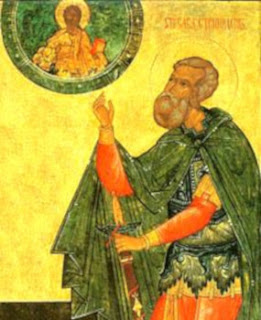
24 April - Saint Sabbas the General.
The Martyr Sabbas came from a Gothic tribe. For his bravery he attained the high rank of military commander or "stratelates," and he served under the Roman emperor Aurelian (270-275).
From the time of his youth Sabbas was a Christian and he fervently followed the commands of Christ - he helped the needy and visited Christians locked up in prison. For his pure and virtuous life the saint received from the Lord the gift of wonderworking and in the Name of Christ he healed the sick and cast out demons.
When the emperor learned that Saint Sabbas was a Christian, he demanded that he apostasize. The martyr threw down his military sash and declared that he would not forsake his faith. They beat him, burnt at him with torches, threw him in a cauldron with tar, but the martyr remained unharmed.
Looking on at his torments, seventy soldiers came to believe in Christ, who then were beheaded by the sword. Saint Sabbas they threw in prison. At midnight during the time of prayer, Christ appeared to the martyr and shone on him the Light of His Glory. The Saviour bid him not to fear, but rather stand firm. Encouraged, the Martyr Sabbas underwent new torture in the morning and was drowned in a river (+272).

Advice You Can Bank On
A Catholic Perspective On Finances
Frugal Living Ideas & Exploring Creativity
With everything skyrocketing in price, from vegetables, to beef, to gas, the timing of this article couldn’t be any better. We hope to explore frugal living and creative ideas on how to save money in this month’s ‘Advice You Can Bank On’ article.
And be not conformed to this world; but be reformed in the newness of your mind, that you may prove what is the good, and the acceptable, and the perfect will of God. (Romans 12:2)
The first step in accomplishing anything is to have a plan. Planning trips to the grocery store can cut down on the cost of impulse buying and can make your trip more worthwhile. Whether you attend in-person or shop online, write out a list out and stick to it. We like to plan for at least one week of meal planning and write our list accordingly.
As mentioned in our previous month’s article, our family prefers the online shopping experience. We also tend to buy generic over name brand. The generic brands are cheaper, and in most cases are just as good as the name brand versions.
Avoiding the grocery store is a good way to save money as well. If your family is like ours, your pantry probably has plenty of food in it, you “just need one more item” that sends you back to the store, and before you know it, you’re $50 in. I have termed this “middle grocery shopping” (shopping in the middle of regular trips), and it really tends to send our grocery budget over the top.
We live in a city that has some world-renowned restaurants and top-notch dishes. When we decided to take the ‘dining out’ portion of out of our budget, it wasn’t because the food wasn’t delicious. Considering the standard markup of restaurant dishes is 300%, it seemed more like a necessity. When you take a family of four out to dinner at a ‘nice’ restaurant, and the bill is $150, it’s not even a question any longer.
Most restaurants will provide an ingredient listing of the dishes they offer. We’ve taken this to the next level and have made our favorite dishes at home, at a third of the cost. A quick internet search will usually provide you with a recipe as well. This has been a wonderful way to experience the high-quality foods we love without breaking the bank.
Other ideas that can go a long way are making your own cleaning products and detergents. We’ve already experimented with making soap, and we plan on making our own laundry detergent and cleaning supplies. The ingredients are easy to source, relatively cheap, and a decent sized batch will last at least six months. We end up sharing with our family and friends who love the hand made soaps with all the moisturizing qualities an expensive bar contains, at a fraction of the price. There are recipes galore for soaps, cleaning supplies, laundry detergents, and dishwashing detergents available online.
Another DIY approach our family has taken to save money is at-home grooming. We no longer use the salon, or the barber for our haircuts. The cost of a pair of sheers is about $15, as compared to the cost of a trip to the salon is about $300, and the cost to the barber is about $45. The sheers pay for themselves immediately. This has been a huge money saver (and time saver) for our family.
Lastly, our family loves to thrift shop. There is something about it that just feels good. We can find name brand items for a fraction of the original cost, and when your family is constantly growing up, like ours, thrifting will save you tons of money. Depending on where you shop, your dollars spent will go towards a charitable cause, making this option a double bonus; keeping your costs down while charitably giving.
To recap the ideas mentioned here, they are listed for you for easy reference:
-
Meal plan and prep for the week
-
Write a grocery list and stick to it
-
Buy generic if possible
-
Don’t “middle” grocery shop (shop between regular trips)
-
Remake your favorite restaurant dishes at home
-
Make your own cleaning supplies and detergents
-
DIY haircuts
-
Thrift shop
These are just a few ideas to help you to live frugally and an excuse to be creative while doing so. There are many more ideas available to you at the tips of your fingers, some more extreme than what we have mentioned here. We hope that you can try some of these ideas and that they benefit you in keeping your costs down.

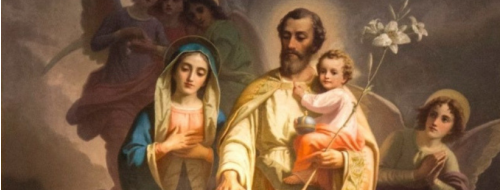 Family Matters
Family Matters
The Heritage of the Generation to Come
But my servant Caleb, because he had another spirit with him, and hath followed me fully, him will I bring into the land where into he went; and his seed shall possess it. (Numbers 14:24)
We all are familiar with the principle of inheritance. It is practiced by most in our culture. Its roots are found in the precepts of God's Word. An inheritance is that which is passed on to the next generation. It is a sad but true reality that this word has lost its powerful meaning. We live in a departing culture, in a society that is slowly departing from “the faith once delivered to the saints.” (Jude 3b). Today, most people think of a piece of property, money, or a business when they hear the word inheritance. This is not entirely wrong. As we see in the Law, God did give specific instructions concerning the inheritance of properties. Yet, He says far more about the inheritance of spiritual benefits. Americans have managed to retain these precepts on a material level., but have sadly lost sight of them on a spiritual level, even though God says ten times more about passing on a spiritual inheritance to the next generation.
In the text at the beginning of this chapter, we have one of my favorite Bible characters and a precious verse to inspire us. Canaan was a real place with real property and wealth, and God promised it all to the children of Israel. However, Canaan also represents spiritual realities that abound in blessings for the people of God who walk in the New Covenant. It is the will of God, yea, the command of God, that our children (our seed) posses all those spiritual blessings. This is “The Heritage of the Generation to Come.” God wants each one of us to enter into the beautiful land of Cannan (the abundant life that is in Christ Jesus), and then to pass those treasured possessions on to our children. This, dear parents, is an inheritance that cannot be measured in dollars.
Two Ways To Build The Kingdom
In the Bible, God reveals two different ways to build the Church. I believe that a balanced Christian parent will be active in both of them. In fact, if we do not follow both paths, the church will never come to the fullness of stature (or maturity) that Paul mentions in Ephesians 4. Both of these paths are found in Proverbs 11:30: “The fruit of the just man is a tree of life: and he that gaineth souls, is wise” In the first part of the verse. We can see the influence of a godly person's life. It is as a tree that keeps on producing life and blessings to others. We know that generations of trees come forth from one tree. So also, in the kingdom of God, a righteous tree produces seed that will become a righteous tree. The Parish is built in this way. As parents possess spiritual realities, they pass them on to the next generation, and a strong Parish rises up from them.
The second path mentioned in this verse is to obey the Great Commission that Jesus gave to the Apostles before He ascended back to the Father. “Go ye into the whole world, and preach the gospel to every creature.” (Mark 16:15) A healthy New Testament Parish will win soul for Christ. They will evangelize those around them in their community. They will go out into the highways and hedges and compel them to come to the Saviour, to be salvaged from their sin, to be united by baptism with the Catholic Church and to have fellowship with those of like faith. If this path is not followed, the Parish will not mature. A Parish that is not fulfilling the great commission in their own community is standing on dangerous grounds. The history of traditional parishes is full of examples in which sincere people focused on themselves and their families, neglecting others, outside of their Parish. Therefore , the Parish must follow both of these methods of growth if she is to increase in numbers and mature in stature. Let us win our children to a whole hearted love for Jesus Christ, and let us win a lost world to the same.
Next month: God's Plan for the Children


Books to feed your faith!
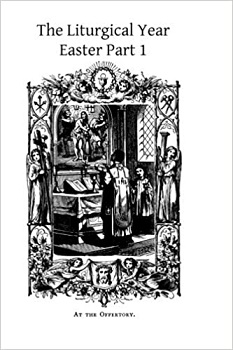
The Liturgical Year: Easter Part 1 (Volume 7)
$16.95
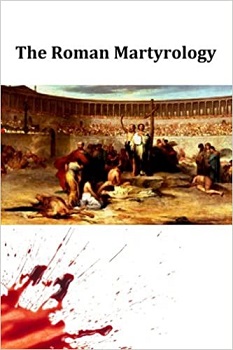 The Roman Martyrology
The Roman Martyrology
$19.95
Will the Real Catholic Church Stand Up?
Kindle $2.99 / Paperback $9.95
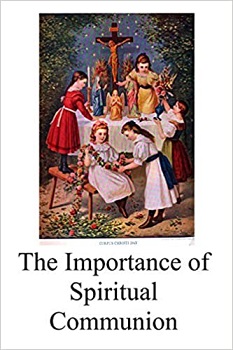
The Importance of Spiritual Communion
Kindle $2.99 / Paperback $5.99
If we cannot receive Holy Communion actually, then let us do so spiritually. These prayers and instructions have been gathered from the Saints and other venerated spiritual writers. Spiritual Communion has been a part of the spiritual life for decades. Growing up I was instructed to make a Spiritual Communion, when I could not go to Communion such as when I assisted at a second Mass. The same is true if one finds oneself at Mass, but not fasting. There are times coming, when it will be difficult, if not impossible to assist at the Holy Sacrifice of the Mass. We should be prepared for such times.
For More Good Traditional Catholic Books:

Italian Easter Bread (Anise Flavored)

Cook: 20 mins
Additional: 1 hr 25 mins
Total: 2 hrs
Prep: 15 mins
Servings: 10
Yield: 1 loaf
Ingredients
3 cups all-purpose flour, divided
¼ cup white sugar
1 teaspoon salt
1 (.25 ounce) package rapid rise yeast
⅔ cup milk
1 teaspoon anise extract
2 tablespoons butter at room temperature
2 eggs
1 egg, beaten
½ tablespoon colored candy decorating dragees, or as desired
Instructions
Step 1. Mix 1 cup of flour with sugar, salt, and yeast in a bowl, stir well. Place milk and anise extract into a small saucepan over low heat, and warm to about 110 degrees F (43 degrees C). Make a well in the center of the flour mixture with your hand, and pour in the milk mixture; swirl with your hand in a circular motion to combine the flour mixture with the milk mixture. Mix in butter and eggs, one at a time, then mix in remaining flour until dough begins to pull together.
Step 2. Turn the dough out onto a floured work surface, and knead until soft but elastic, about 8 minutes. Cover with a damp cloth, and let dough rest for 10 minutes; cut dough into halves.
Step 3. On floured work surface, roll each half into a ball, then shape the balls into 2 long pieces, about 1 1/2 inches thick and 18 to 20 inches long. Pinch the 2 top ends together, and loosely twist the pieces to form a twisted loaf; pinch the bottom ends together, and tuck the two ends underneath the loaf. (Alternately, form the twist into a ring, and pinch the ends together.)
Step 4. Grease a baking sheet, lay the loaf onto the prepared sheet, and cover with a damp towel; let rise until doubled, about 1 hour. Brush loaf with beaten egg, and sprinkle with colored decorating dragees.
Step 5. Preheat oven to 350 degrees F (175 degrees C). Bake the decorated loaf in the preheated oven until golden, 20 to 25 minutes. Watch closely towards the end of the baking time that the bread does not begin to burn. Transfer to wire rack immediately after baking to cool.
Cheese Puffs

Cook: 25 mins
Additional: 15 mins
Total: 1 hr 25 mins
Prep: 45 mins
Servings: 12
Yield: 24 medium puffs
Ingredients
1 cup all-purpose flour
½ teaspoon salt
½ teaspoon fresh ground black pepper
½ teaspoon dried thyme
½ teaspoon chili powder
1 pinch cayenne pepper
1 cup whole milk
1 stick butter (cut into 1/2 inch cubes)
6 large eggs (at room temperature)
½ cup grated Parmesan or Romano cheese
¾ cup grated Gruyere cheese
1 ounce pepperoni, diced (Optional)
2 tablespoons milk
2 tablespoons grated Parmesan cheese
Instructions
Step 1. Preheat oven to 425 degrees F (220 degrees C).
Step 2. Combine the flour with the salt, black pepper, thyme, chili powder, and cayenne pepper in a large bowl.
Step 3. Put the milk and butter in a large saucepan and bring to a boil. When the butter melts, turn heat to low. Add the seasoned flour all at once. Stir vigorously with a wooden spoon until the dough forms a ball. Remove from heat.
Step 4. Separate the white and yolk from one egg, reserving the yolk for glazing.
Step 5. Put the dough into a large mixer bowl. Beat at medium speed for one minute. Then beat in one egg and the extra egg white. Beat until completely absorbed into the dough. Then add the remaining 4 eggs, one at a time, waiting each time until the previous egg is completely absorbed. After all 5 eggs (plus the one egg white) have been incorporated, the dough should be smooth and satiny.
Step 6. Add the Parmesan and Gruyere cheeses, and pepperoni if you are using it. Incorporate thoroughly into the dough.
Step 7. Use a pastry bag to pipe dough onto 2 ungreased baking sheets. You can also drop dough from a teaspoon. For tiny puffs, mounds should be about 1/2 inch in diameter. From small appetizers, mounds should be 1 inch in diameter. For puffs large enough for filling, mounds should be 1 1/2 inches in diameter. Keep the size of the puffs uniform so they bake properly. Space puffs about 1 inch apart.
Step 8. Beat the remaining egg yolk with 2 tablespoons of milk to make a glaze. Lightly brush the tops of the puffs with glaze before baking. Sprinkle tops with your Parmesan cheese.
Step 9. Bake in pre-heated oven for 10 minutes (5 minutes for tiny puffs). Reduce heat to 300 degrees F (150 degrees C). Bake 10 minutes more for tiny puffs; 15 to 20 minutes longer for medium or large puffs, or until puffs are golden brown. Test by removing a puff from the oven and breaking it open. The inside should be baked through. If it is still doughy or wet, bake another 5 minutes.
Step 10. Remove pans from oven and leave puffs on pans until cool enough to serve.
Video sermons and instructions: Timeless timely truths for living the Faith
Low Sunday (2011)
One Flock (2013)
Go and Sin No Less
A Catechism story: St. Cecilia

Encouragement for Today
Therefore encourage one another and build one another up.... I Thessalonians 5:11
We believe that through our assorted podcasts, Vlogs, audio downloads and devotional blogs, you will find an assorted Treasure Chest of...
- Sermons
- Classic Catholic Audio Books.
- Devotionals
- Scripture Studies
- Catechism Lessons
- Old-Time Christian radio programs
- Catholic Videos
...that will be a help in your faithful walk with the Lord.
LEARN MORE AT THE ENCOURAGEMENT FOR TODAY WEBSITE: https://www.encouragementfortoday.com
Truths From Genesis 1:1
The Universe Had a Beginning
This first verse tells us that the universe was brought into existence-it was created by God.
This means that before the universe was made, there was no universe-no earth, no time, and in fact, not even any space! I can't even imagine there being no space. How would we try to describe this? We might say that there was nothing. However, I think most people would still think that nothing would mean an empty black place. But the universe was not even a place before creation-it wasn't black-because it just wasn't!
The only way I have ever been able to describe this, to even try to understand it, is to say there was not even nothing (but there was God-more next month on this). We can't even think what not even nothing would be like.
Not even nothing! It couldn't be black-because that would be something! This is impossible for us to understand because we are created beings-we were created by god. This means God must be so much more powerful than us, so there are going to be many things we will not understand. This should make us realize more and more how big and powerful God is.
If God made the universe, what did he make it from? The word “created” used in this first verse really means that God brought into existence materials that had no previous existence to make everything that now exists. God made the universe from materials that He created from “not even nothing.”
In the book of Hebrews in the New Testament we read that, “By faith we understand that the world (this means everything) was framed by the word of God; that from invisible things visible things might be made.” (Hebrews 11:3) This also teaches us that the things we see now were made from materials that previously did not exist, but God brought them into existence! It helps us to begin to understand how powerful God is.
In Psalm 33:9, we are told about how God does things, “For he spake, and it was done; he commanded, and it stood fast.” How dies God do things? He just commands it to happen- and it happens. How did He make the universe? He just spoke it into existence! Look at all the following verses in Genesis chapter 1:3,6,9,14,20,24, and 26. They all start with “And God said” or in vs 26- “Then God said”. He just spoke, and things happened-things came into existence. He just spoke, and suddenly, from “not even nothing” there was something. Only God could do this.
In Mark 4:39, we are told the account of how Jesus, God's Son, was on a boat with the disciples and a great storm arose. He spoke to the wind and sea and they obeyed him! “And rising up, he rebuked the wind, and said to the sea: Peace, be still. And the wind ceased: and there was made a great calm.”
When the disciples saw this, they said “Who then is this, that even the wind and the sea obey him?” (Mark 4:41). In other words, who is this who can just speak to the wind and sea and they obey Him? Well, the answer is that this is the Creator! Colossians 1:16 tells us that all things were created by Him, through Him, in Him, for Him. No wonder the sea and the wind obeyed Him-he made them!
If all things were made by Him, it means we were made by Him. Actually, God made our first parents and designed them to have children, and their children to have children, and so on. God did not make directly from dust like He did Adam, but we are all children of Adam. So we can certainly say God made us (Psalms139:13-14)
Before God spoke the universe into existence, we did not exist, except God knew we would exist. For instance, in Jeremiah 1:5, God said this about Jeremiah, “Before I formed thee in the bowels of thy mother, I knew thee: and before thou camest forth out of the womb, I sanctified thee, and made thee a prophet unto the nations.” God in eternity knew each one of us just as he knew Jeremiah, before we came into existence. That gives us more of a glimpse of how great God is.
Now we do exist, and we think, and make decisions. And yet our first parents were made from dust that originally did not exist, but which God spoke into existence!Oh, how great God is.
And what did God first create? He created time (In the beginning); He created space (God created the heavens and the earth).
Next Month: GOD HAD NO BEGINNING.
Catechism Catch-Up
Confirmation-The Seven Fold Grace of God pt 1: Wisdom, Knowledge, Understanding

In the Catechism of the Council of Trent we read:
Quote “In Confirmation is contained the true and proper nature of a Sacrament has always been acknowledged by the Catholic Church.” the Catechism goes on to say, “The truth of this doctrine St. Clement could not confirm in stronger terms than when he says, 'All should hasten without delay to be born again (baptized) unto God, and afterwards to be signed (confirmed) by the Bishop.” that is to receive the seven fold grace of the Holy Ghost; for, as has been handed down to us from St. Peter, and as the other Apostles taught in obedience to the command of Our Lord, he who culpably and voluntarily, and not from necessity, neglects to receive this Sacrament, cannot possibly be a perfect Christian.' To be a perfect and complete Christian one needs to be sealed at the day of their confirmation with the seven fold grace of the Holy Ghost.”
What is the seven fold grace of the Holy Ghost? And what are they used for in our Christian life?
The seven fold grace of the Holy Spirit that, initially, are magnified in us at our confirmation and are unique skills and abilities given by the Holy Spirit to faithful followers of Christ to serve God for the common benefit of his people, the Church. And for reaching others, out side of the Church, for Christ. The seven fold grace, referred to by the Catechism, is described in Isaiah 11:1-3, where it mentions wisdom, understanding, counsel, fortitude, knowledge, and Piety and the fear of the Lord. The seven fold grace of the Spirit, mentioned in Isaiah, are simply God empowering faithful Christians to do what He has called us to do. The Catholic Church list them as:
-
Wisdom
-
Understanding
-
Counsel
-
Fortitude
-
Knowledge
-
Piety -Godliness
-
Fear of the Lord
Now Concerning Wisdom, knowledge and Understanding? And what is the differences between the three?
Wisdom and knowledge and understanding, are recurring themes in the Bible, and are related but not synonymous. As far as Widsom and Knowlege is concerned, the dictionary defines wisdom as “The right use or exercise of knowledge; the ability to discern or judge what is true, right, or lasting” Knowledge, on the other hand, is “information gained through experience, reasoning, or acquaintance.” Knowledge can exist without wisdom, but wisdom can not exist without knowledge. One can be knowledgeable without being wise. Knowledge is knowing how to use a gun; wisdom is knowing when to use it and when to keep it holstered.
God wants us to have knowledge of Him and what He expects of us. In order to obey Him, we have to have knowledge of His commandments. But as equally important as having knowledge is having wisdom. Knowing facts about God and the Bible is not all there is to wisdom. Wisdom is a gift from God. James 1:5 states, “But if any of you want wisdom, let him ask of God, who giveth to all men abundantly, and upbraideth not; and it shall be given him.” God blesses us with wisdom in order for us to glorify Him and use the knowledge we have of Him.
The book of Proverbs is perhaps the best place in the Bible to learn of biblical wisdom. Proverbs 1:7 speaks of both biblical knowledge and wisdom: “The fear of the Lord is the beginning of knowledge. Fools despise wisdom and instruction. ” To fear the Lord is to start on the path to knowledge, and God can then begin to provide us with wisdom through Christ, who the Bible says is wisdom itself: “But of him are you in Christ Jesus, who of God is made unto us wisdom, and justice, and sanctification, and redemption: ” (1 Corinthians 1:30).
Knowledge is what is gathered over time through study of the Scriptures. It can be said that wisdom, in turn, acts properly upon that knowledge. Wisdom is the fitting application of knowledge. Knowledge understands the light has turned red; wisdom applies the brakes. Knowledge sees the quicksand; wisdom walks around it. Knowledge memorizes the Ten Commandments; wisdom obeys them. Knowledge learns of God; wisdom loves Him.
At first glance, it seems that the authors of the Bible use the words “wisdom,” “knowledge,” and a third term, “understanding,” almost interchangeably. A closer examination shows a difference in the way the three terms are used. This difference is very important for our understanding of this third mental model of “wisdom and knowledge.”
Simply put, these gifts as they are called in the Bible are defined as:
-
Knowledge – the facts.
-
Understanding – ability to translate meaning from the facts .
-
Wisdom – knowing what to do next, given an understanding of the facts and circumstances.
Those with knowledge are able to collect, remember, and access information. But, it is possible to have knowledge and lack understanding and wisdom. Someone might have the facts, but not know what they mean or what to do next.
Those with understanding are able to extract the meaning out of information. They “see through” the facts to the dynamics of what, how, and why. Understanding is a lens which brings the facts into crisp focus and produces principles.
Those with wisdom know which principle to apply in a given context. Understanding without wisdom can appear contradictory. For example, the statement, “He who hesitates is lost,” is true, but so is the idea that “haste makes waste.” Which principle to use depends on the context. Those with wisdom know what actions to take next. They do the right thing in the given situation. In contrast, there are many who have great knowledge and understanding but who consistently do the wrong thing.
It has been said,
Wisdom is the right use of knowledge. To know is not to be wise. Many men know a great deal, and are all the greater fools for it. There is no fool so great a fool as a knowing fool. But to know how to use knowledge is to have wisdom.
In any given situation, God rarely gives all three gifts to any one person. We need to cooperate and assist each other with our particular gift in order to accomplish what God has called us to do, especially in our vocational work.
This is what economists call the “knowledge problem.” No one person or group can have absolute knowledge or know all the facts, though we are all supposed to work towards developing and acquiring knowledge, wisdom, and understanding in our lives. God is the only one who does not have a knowledge problem.
Let’s look closer at this idea of knowledge.
The New Testament word “disciple” literally means “a learner.” Christians are called to a careful study of the Bible. This will help us acquire the knowledge that we need in order to do what God has called us to do. Jesus said,
If you continue in my word, you shall be my disciples indeed. And you shall know the truth, and the truth shall make you free. (John 8:31–32).
One author wrote in his daily devotional that,
Our Lord calls for a continued application of the mind to His Word. A disciple does not dabble in learning. He makes the pursuit of an understanding of God’s Word a chief business of his life.
READ MORE FROM THE TRADITIONAL CATECHISM AT THE WEBSITE: https://www.traditionalcatechism.com
Living Catholic:
You Might Have Left Your First Love If.....

Every Christian should be aware of the danger of leaving his first love for the Lord. Long ago, the church in Ephesus was busy doing many things for God, yet Jesus said, “But I have somewhat against thee, because thou hast left thy first charity.” (Revelation 2:4).
The Lord commanded them, “Be mindful therefore from whence thou art fallen: and do penance, and do the first works. Or else I come to thee, and will move thy candlestick out of its place, except thou do penance.” (Revelation 2:5).
Several things can indicate that you are wandering from your first love:
1. You delight in someone else more than you delight in the Lord.
Your love for God should be foremost in your heart, exceeding the bond of any other relationship. Jesus identified the greatest of all commandments: “And thou shalt love the Lord thy God, with thy whole heart, and with thy whole soul, and with thy whole mind, and with thy whole strength. This is the first commandment.” (Mark 12:30).
2. Your soul does not long for times of rich fellowship in God’s Word or prayer.
“Thou shalt love the Lord thy God with all thy . . . soul . . .” (Mark 12:30). When your mind, will, and emotions wander from devotion to God, watch out.
Your relationship with God deepens as you spend time in His Word and commune with Him in prayer. If you forsake this fellowship, your understanding of your true condition before God will grow dull. As God’s children, His friends, and His bride (see Matthew 5:44–45, James 2:23, John 15:15, and Revelation 21:9), it is critical that we draw near to Him to engage in our relationship with Him. (See James 4:7–8.)
3. Your thoughts in leisure moments do not honor the Lord.
“Thou shalt love the Lord thy God with all thy . . . mind . . .” (Mark 12:30). The things that captivate your thoughts in leisure moments reveal much about the priorities of your heart. The Apostle Paul instructed us, “Whatsoever things are true, whatsoever modest, whatsoever just, whatsoever holy, whatsoever lovely, whatsoever of good fame, if there be any virtue, if any praise of discipline, think on these things.” (Philippians 4:8).
4. You make excuses for doing things that displease the Lord, claiming to be “only human.”
“Thou shalt love the Lord thy God with all thy . . . strength” (Mark 12:30). God wants you to dedicate your life to Him as a “living sacrifice” (see Romans 12:1–2), discerning His will in all things and walking in obedience to Him. As your Good Shepherd, He will lead you “in the paths of justice for his name’s sake” (Psalm 23:3).
There is no excuse for disobeying the Lord. His grace is sufficient to rescue you from every temptation. (See I Corinthians 10:13.) The truth is, “But every man is tempted by his own concupiscence, being drawn away and allured. Then when concupiscence hath conceived, it bringeth forth sin. But sin, when it is completed, begetteth death. Do not err, therefore, my dearest brethren.” (James 1:14–16).
Your obedience to God demonstrates your love for Him. Jesus said, “If ye love me, keep my commandments” (John 14:15). “If ye keep my commandments, ye shall abide in my love” (John 15:10).
5. You do not willingly and cheerfully give to God’s work or to the needs of others.
Generosity is part of God’s holy character: “For God so loved the world, that he gave . . .” (John 3:16), and He “loveth a cheerful giver” (II Corinthians 9:7). Therefore, “He that hath the substance of this world, and shall see his brother in need, and shall shut up his bowels from him: how doth the charity of God abide in him?” (I John 3:17).
As believers, we are to love and give—even to our enemies. (See Luke 6:27–36, Romans 12:20, and Matthew 5:42.) We can do this only by the grace of God, as He renews our minds and teaches us to walk in obedience to His voice.
6. You cease to treat others as you would treat the Lord.
Jesus said, “A new commandment I give unto you, That ye love one another; as I have loved you, that ye also love one another” (John 13:34). “Love one another” is not a suggestion; it is a command that we are enabled to fulfill by the work of the Holy Spirit in our lives.
Do you find that you are quick to judge and condemn others? Consider God’s love for you and His command that you love others with His love. “In this is charity: not as though we had loved God, but because he hath first loved us, and sent his Son to be a propitiation for our sins. My dearest, if God hath so loved us; we also ought to love one another.” (I John 4:10–11).
7. You view Christ's commands as restrictions to your happiness rather than expressions of His love.
God’s commandments, the words of your wise and caring Father, lead you toward what is good and away from what is evil. “He that hath my commandments, and keepeth them, he it is that loveth me: and he that loveth me shall be loved of my Father, and I will love him, and will manifest myself to him” (John 14:21). Obedience to His commandments brings true freedom and joy. (See John 8:31–32, 36.)
8. You strive for affirmation from the world rather than approval from the Lord.
Jesus faced misunderstandings and rejection because of His obedience to God, and you will face similar situations. “If you had been of the world, the world would love its own: but because you are not of the world, but I have chosen you out of the world, therefore the world hateth you.” (John 15:19).
“Love not the world, neither the things that are in the world. Love not the world, nor the things which are in the world. If any man love the world, the charity of the Father is not in him. For all that is in the world, is the concupiscence of the flesh, and the concupiscence of the eyes, and the pride of life, which is not of the Father, but is of the world. And the world passeth away, and the concupiscence thereof: but he that doth the will of God, abideth for ever.” (I John 2:15–17).
9. You fail to make Christ or His words known because you fear rejection.
If your faithfulness to God depends on the reaction of those around you, you are serving men instead of serving God. (See Galatians 1:10.) Jesus’ obedience to God aggravated many people, including the religious leaders of his community. “Remember my word that I said to you: The servant is not greater than his master. If they have persecuted me, they will also persecute you: if they have kept my word, they will keep yours also. ” (John 15:20).
Be faithful to proclaim the truth in love, because God “I will not leave thee, neither will I forsake thee. So that we may confidently say: The Lord is my helper: I will not fear what man shall do to me.” (Hebrews 13:5–6).
10. You refuse to give up an activity that you know is offending a weaker brother.
In every generation, Christians seek God’s will concerning discretionary activities. “Therefore every one of us shall render account to God for himself. Let us not therefore judge one another any more. But judge this rather, that you put not a stumblingblock or a scandal in your brother's way. I know, and am confident in the Lord Jesus, that nothing is unclean of itself; but to him that esteemeth any thing to be unclean, to him it is unclean. For if, because of thy meat, thy brother be grieved, thou walkest not now according to charity. Destroy not him with thy meat, for whom Christ died.” (Romans 14:12–15). (See also Romans 12:10 and Philippians 2:3–8.)
11. You become complacent toward sinful conditions around you.
Jesus warned that “And because iniquity hath abounded, the charity of many shall grow cold.” (Matthew 24:12). Witnessing the sinfulness of the world around you should motivate you to follow after God with even greater determination. “Be sober and watch: because your adversary the devil, as a roaring lion, goeth about seeking whom he may devour. Whom resist ye, strong in faith:” (I Peter 5:8–9).
12. You are unwilling to forgive your offenders
“If any man say, I love God, and hateth his brother; he is a liar....” (I John 4:20). Holding a grudge against another person indicates that you have lost sight of the greatness of God’s forgiveness of your sin and your need for His grace. (See Matthew 18:21–35.)
Bitterness is the natural fruit of unforgiveness. As believers, we are to “Follow peace with all men, and holiness: without which no man shall see God. Looking diligently, lest any man be wanting to the grace of God; lest any root of bitterness springing up do hinder, and by it many be defiled.” (Hebrews 12:14–15). A spirit of forgiveness is essential to the Christian. Jesus said, “But if you will not forgive, neither will your Father that is in heaven, forgive you your sins. ” (Mark 11:26).
Return to Your First Love for the Lord
A prayer of ancient Israel’s leader, Moses, gives us insight into the goal of keeping our first love: “If therefore I have found favour in thy sight, shew me thy face, that I may know thee, and may find grace before thy eyes: look upon thy people this nation. ” (Exodus 33:13). The longing of our hearts should be to know God, to know Him intimately. That is the reason for knowing His ways and His will: to know Him. And this is God’s promise to His children: “You shall seek me, and shall find me: when you shall seek me with all your heart.” (Jeremiah 29:13).
If your love for God has grown cold, take steps to renew your relationship with Him. Return to your first love. He waits for you with open arms.
To Learn More Principles For Life Go To: Resources: Principles of Life


Pray for the Holy Father! Pray with the Holy Father!
- Your prayers are asked this month and every month for the intentions of the Holy Father, Pope Michael.
- Please pray for the success and growth of the new Chrysostom Bible Institute. Check out the wonderful work it is doing and see how you can get involved!
- Your prayers and support are asked in a special way for the soon to be established House of Prayer.
- Pray especially that the Holy Ghost inspires and helps us prepare spiritual manuals and days of recollection to make available to all.
- Keep in your prayers our Podcast Ministry, a new way to reach out in the missionary work of the Church! We ask for prayers for our other activities world wide. We have made good contacts in the Philippines and Japan and ask prayers that these contacts will bear much fruit for the salvation of souls.
- Be sure to keep St. Helen Catholic Mission in your prayers. Why not go on over to the site now and see what they have to offer and how you might be able to help!
- Also we ask you to keep in prayer our increasing missionary work in the United States and elsewhere.
- Pray for those outside the Church and those who do not know God, that they may see the light of grace and be led safely home to the refuge of the Holy Catholic Church.
- As always, we also ask that you pray for yourself! Never forget your own state of soul. God is calling you to His service in His love. We know that our Lord can count on you to answer.
- We are all praying especially for you, too. May you correspond with every grace of God!
- In what other needs or intentions may we pray for you? Let us know!
- Let us remember that the Church runs on prayer. Without your prayers, God will not work in hearts and souls to bring them to a knowledge of the truth. (I Timothy 2:4)


To Donate online go to:

To Donate by Mail:
Our address is
Vatican in Exile
829 NE Chester
Topeka, Kansas 66616
Make Checks payable to:
Vatican in Exile


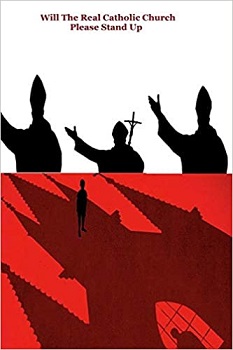









 Follow
Follow


